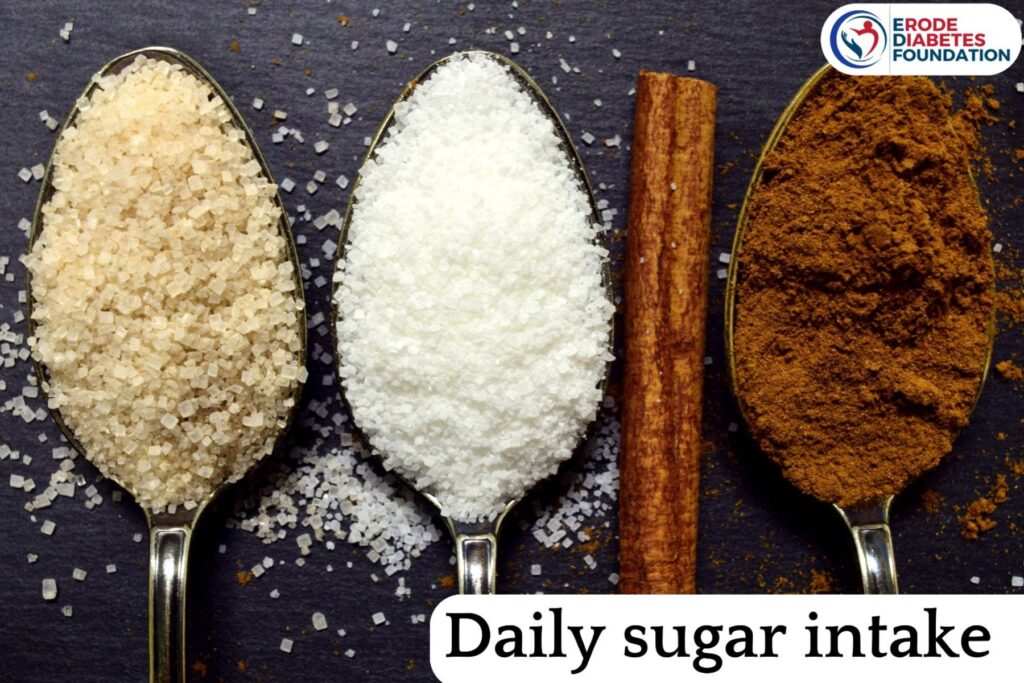Living with diabetes means being careful about what you eat and how you live. Moreover, one of the critical aspects of managing this condition is limiting daily sugar intake to regulate blood sugar levels effectively. Whether you’re newly diagnosed for diabetes or you’re trying to get better at managing it, here’s an easy guide to help you understand how to cut down on daily sugar intake.

Understanding Glycemic Index (GI)
Focus on foods with a low GI, such as whole grains, legumes, non-starchy vegetables, and certain fruits like berries and citrus fruits. As, they cause a slower rise in blood sugar levels, making them ideal choices for individuals with diabetes.
Opting for Complex Carbohydrates
Choose complex carbohydrates over refined grains to prevent sudden spikes in blood sugar levels. Further, whole grains like brown rice, oats, and quinoa are excellent choices. Above all, they provide continuous energy without the rapid sugar increase associated with refined grains like white rice and white bread.
Mindful Portion Control
Be mindful of portion sizes, particularly when consuming high-carb foods like rice and fruits. Further, use measuring cups or a food scale if necessary to ensure you’re managing your carbohydrate intake effectively.
Balancing Meals
Maintain balance in your meals by incorporating carbohydrates, proteins, and healthy fats. Also, pairing it with fiber-rich foods can help slow down digestion, preventing sharp increases in blood sugar levels.
Reading Labels
Always check food labels for hidden sugars. Avoid processed and packaged foods that often contain added sugars in various forms such as syrups, fructose, and corn sweeteners.
Limiting Sugary Beverages
Avoid sugary drinks like soda and fruit juices, choosing instead for water, herbal teas, or unsweetened beverages to reduce your thirst without compromising your blood sugar levels.
Healthy Snacking
Choose nutritious snacks such as nuts, seeds, Greek yogurt, vegetables with hummus, or fruit with nut butter to control cravings while keeping your blood sugar in check.
Cooking at Home
Take control of your diet by preparing meals at home using fresh, whole ingredients. This enables you to regulate the quantity of added sugars and unhealthy fats in your dishes, promoting better diabetes management.
Using Natural Sweeteners Carefully
If you require sweeteners, opt for natural alternatives like stevia, monk fruit, or erythritol in moderation. However, remain cautious about their impact on blood sugar levels.
Regular Monitoring
Consistently monitor your blood sugar levels to understand how different foods affect them. Furthermore, schedule regular follow-up appointments with your diabetologist or dietitian to adjust your diet and treatment accordingly for best diabetes management.
Additional tips for limiting Daily sugar intake
- Increase vegetable intake, reduce oil and sugar in cooking.
- Stay hydrated.
- Plan meals and snacks ahead to avoid impulsive choices.
- Practice stress-reduction techniques like meditation or yoga.
- Engage in regular physical activity for better blood sugar control.
- Understand the glycemic index of foods and their impact on blood sugar.
Benefits of controlling daily sugar intake
- Maintains stable blood sugar levels for diabetes management.
- Controls weight and reduces obesity risks.
- Supports heart health
- Protects oral health to prevent tooth decay.
- Feel better and stay healthier overall.
- Reduces the risk of chronic diseases
To Conclude
By implementing these tips and making gradual changes to your lifestyle, you can effectively manage your diabetes and improve your overall health and well-being. Remember that consistency and persistence are key, and don’t hesitate to seek professional guidance and support whenever necessary.


